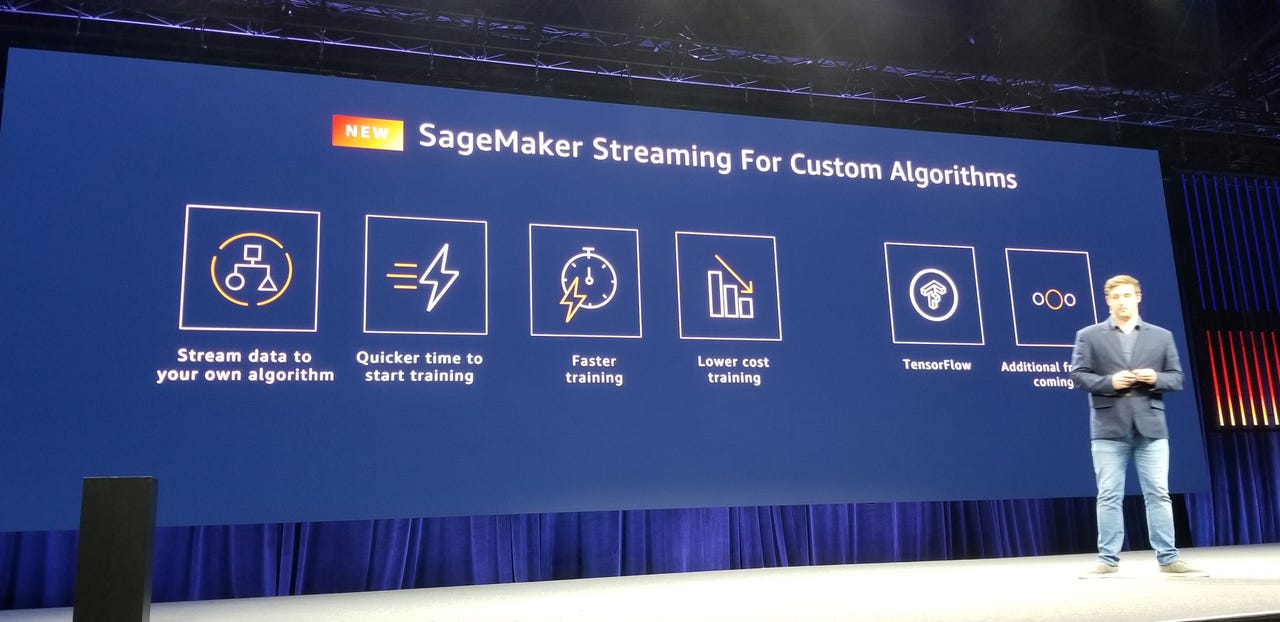AWS adds BYO streaming algorithms to SageMaker machine learning platform


Amazon is enabling enterprises to bring your own algorithms to stream on its SageMaker machine learning service in a move designed to increase training speeds. Those algorithms will initially run on TensorFlow.
Dr. Matt Wood, director of machine learning at AWS, said at the AWS Summit in New York that SageMaker is bringing streaming algorithms as well as batch job improvements to SageMaker.
"We see a dramatic decrease in time to train models and put them into production," said Wood.
Wood was outlining AWS' machine learning frameworks and platforms as well as AI services such as Rekognition, Polly and Lex. AWS has shipped more than 100 new services since re:Invent 2017.
What is AI? Everything you need to know about Artificial Intelligence | What is machine learning? Everything you need to know
AWS executives didn't address Amazon's Prime Day site issues during their keynotes.
The SageMaker enhancements come a week ahead of Google's Next cloud conference, which will inevitably feature machine learning improvements and training enhancements. Google Cloud has already outlined services to speed up training with AutoML.
Wood noted that streaming algorithms and batch processing will pull data directly from S3 storage to drive information directly into GPU and CPU instances.
As for the batch processing, SageMaker Batch Transform will enable enterprises to handle big jobs without breaking up data with an API call.
The key takeaways from CTO Dr. Werner Vogels and Wood revolved around machine learning and edge computing and giving AI tools to developers. The overall message from execs was that AWS is an analytics, AI and machine learning platform as well as infrastructure. Consider:
- The company launched EC2 on AWS Snowball Edge, which will have up to 16 vCPUs and be designed to preprocess data on site. It will also collect analytics sets at remote sites.
- S3 is increasingly being viewed as a data lake. S3 request performance has been increased and prepped for parallel processing. S3 was continually referenced as a data lake by customers as well as execs. Vogels added that AWS Glue is designed to aggregate data from everywhere.
- It's clear that AWS is starting to see itself as a data aggregator so information can be used for analytics (using AWS services of course). AWS has migrated more than 80,000 unique databases via the AWS Data Migration Service.
Among other items:
Wood said that Amazon Connect is looking to use AI to bolster contact center performance with transcription, comprehension of voice and analytics.
Amazon Transcribe will get Channel Synthesis to the service to analyze recordings and interaction with agents. Each party is transcribed separately and then put together to manage compliance as well as sentiment.
Amazon Translate will get 12 new language pairs today and 12 more later this year.
Amazon Comprehend will get syntax identification for fine-grained text analysis.
AWS outlined a series of customer wins. A few key ones include:
- Epic Games, the company behind Fortnite, is all-in on AWS and building new games and experiences.
- 21st Century Fox extended a partnership with AWS and will use the cloud provider for the "vast majority" of platforms and workloads. The company will use AWS to delivery on-demand content from the likes of Fox, Fox Sports and FX.
- MLB will use AWS as its official provider for machine learning, artificial intelligence and deep learning. AWS is the provider behind Statcast, which MLB uses to analyze player performance.
- Celgene, which will use Amazon machine learning to analyze drugs in development.
- Formula 1, which will use AWS to crunch data from cars to improve performance and analyze improvements.
Vogels outlined AWS' approach to development, but also noted the company's experience. "There is no compression algorithm for experience," he said.